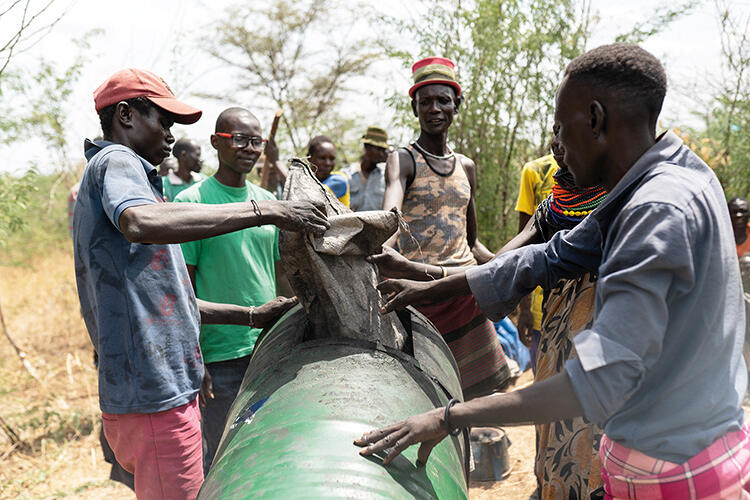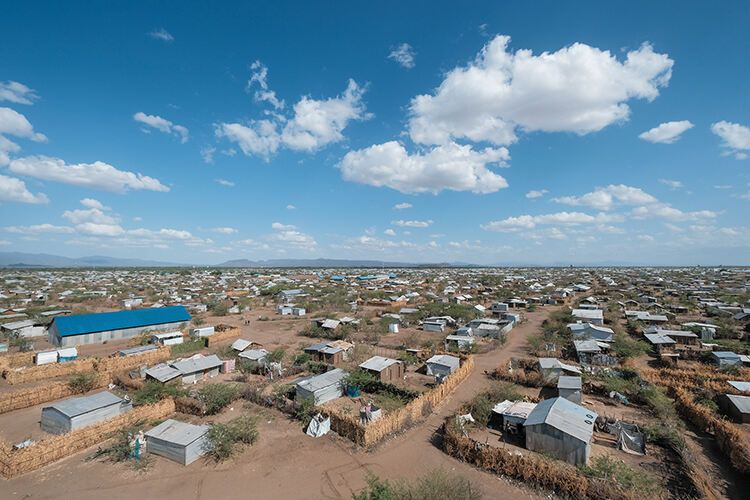
Air pollution is rising across Africa, largely due to domestic fires, but one Kenyan entrepreneur has developed a much cleaner way to cook
In the arid, sandy county of Turkana, among the drought-hit expanses of northwestern Kenya, lies a sprawling refugee camp. Established in 1992, Kakuma (which means ‘nowhere’ in Swahili) was originally built to provide aid to the more than 20,000 young boys who were displaced or orphaned during the Second Sudanese Civil War, a brutal conflict that lasted from 1987 to 2005. Since then, an influx of refugees fleeing conflicts and disasters in Burundi, Eritrea, Ethiopia, Somalia and South Sudan has driven the number of residents to nearly 200,000 – making Kakuma the third-largest refugee camp in the world.
Kakuma was only meant to house a maximum of 70,000 people. Much of the camp consists of informal settlements, constructed from iron sheets, tarpaulin, or traditional mud and thatched buildings. The area faces immense pressure from residents’ demand for potable water, which is largely sourced from boreholes, and for firewood, which is the main fuel used for cooking and heating. When Brian Onyango first arrived at Kakuma in 2018, where he had been commissioned to produce a report on energy access and use within the camp, he says that he saw ‘a huge gap in access to clean fuels, which needed to be addressed’.
Africa is experiencing some of the worst air pollution in the world. In many cities, concentrations of tiny pollution particles – including dust, soot and smoke – are now five to ten times greater than the level recommended by the World Health Organization. In a new study published in Nature Geoscience, Francis Pope, an atmospheric scientist at the University of Birmingham, identifies the burning of biomass fuel – used by nearly 970 million people in Africa for cooking, heating and lighting – as a key cause of the poor air quality in many African nations. ‘This dangerous air can cause complex and sometimes deadly health issues for those breathing it in,’ he says.

In 2019, air pollution contributed to an estimated 1.1 million deaths in Africa, with 63 per cent of all deaths linked to exposure to household air pollution. Refugees are among those in greatest danger, and many of Kakuma’s residents have eye and chest problems due to the soot and smoke produced by cooking fires. Given growing populations, air pollution across the continent is likely to worsen in the coming years, yet less than 0.01 per cent of global funding allocated to the problem is currently spent in Africa.
Outside the refugee camp, the demand for charcoal and firewood has also led to the rapid deforestation of local forest ecosystems (in Kenya alone, logging for charcoal production cleared an estimated 310,000 hectares of trees between 2000 and 2017). Despite reporting on the inefficient and damaging cooking practices at the camp, Onyango says that when he returned to the refugee camp in 2019, he found that nothing had changed.

In 2021, spurred on by the lack of progress, Onyango established a small startup called USAFI Green Energy and began producing a more efficient, affordable model of cooking stove that can be fuelled by clean-burning briquettes. Today, the company’s workforce has grown to 35, of whom ten are refugees from Kakuma, who are employed to manufacture and sell its cookstoves. An additional team, drawn from the local community, are contracted to make the briquettes using material from the invasive, non-native Prosopis juliflora tree. Originally introduced as a way of combating desertification and deforestation in the region, the plant has come to dominate the local vegetation, sucking up the limited water in the ground and poisoning people and livestock.
‘We harvest the invasive prosopis trees locally, then we crush and carbonise them to remove around 30 per cent of their carbon dioxide content,’ explains Onyango. ‘Once they’ve been refined and compressed, they can be burned for up to five hours, producing very little smoke.’

In just two years, USAFI Green Energy has sold more than 21,000 of its cookstoves throughout the camp, and produces more than 100 more a day at its Kakuma factory. Larger stoves have been installed at schools, hospitals and the Kakuma Reception Centre, where the devices have already made a difference. ‘We used to experience a lot of smoke and heat from this kitchen and most staff fell sick often due to these conditions,’ says Supa Agule, head cook at the centre.
Onyango admits that achieving so much in such a short time has been hard work, but his efforts were recognised at this year’s Ashden Awards, which supports companies working towards climate solutions with grants and publicity. His next challenge, he says, is to scale up the company’s operations. ‘We aim to be the leading company providing clean-energy solutions to refugee camps and communities across East Africa.’




